Septoplasty in Tel Aviv
Search and Compare the Best Clinics and Doctors at the Lowest Prices for Septoplasty in Tel Aviv
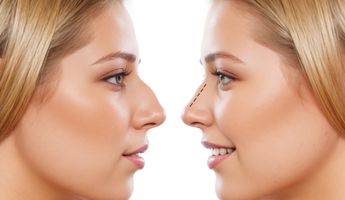
Find the best clinics for Septoplasty in Tel Aviv
With Medijump you can browse 3 facilities offering Septoplasty procedures in Tel Aviv. The cheapest price available is $8,448 in Herzliya. And for the cheapest price globally, prices start from $404 in Romania.
Septoplasty in Israel
Price: $ 8,448
Septoplasty in Herzliya
Price: $ 8,448
Romania offers the best prices Worldwide
Price: $ 404
From 109 verified reviews
Y N, 22 September 2020
Excellent medical center, with friendly staff and highly qualified doctors.Thank you for your work.My operation was successful
Tel Aviv Sourasky Medical Center (Ichilov Medical Center), located in Arison New Hospitalization Building, Tel Aviv, Israel offers patients Septoplasty procedures among its total of 428 available procedures, across 29 different specialties. Currently, there's no pricing information for Septoplasty procedures at Tel Aviv Sourasky Medical Center (Ichilov Medical Center), as all prices are available on request only, whilst the national average price is approximately ฿303,999. There are many specialists available at the Clinic, with 13 in total, and they are accredited by JCI Accredited
InterMedExpert, located in Arison New Hospitalization Building, Tel Aviv, Israel offers patients Septoplasty procedures among its total of 41 available procedures, across 15 different specialties. Currently, there's no pricing information for Septoplasty procedures at InterMedExpert, as all prices are available on request only, whilst the national average price is approximately $8,448. All procedures and treatments are undertaken by the lead specialist at the Hospital, and they are not accredited by any recognized accreditations institutes
Compare Before & After Photos of _procedure_photos.phpSeptoplasty
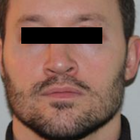
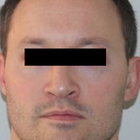
Front view
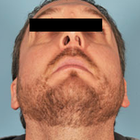
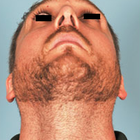
Front view
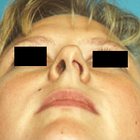
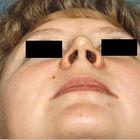
Front view
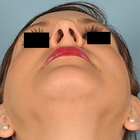
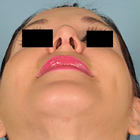
Front view
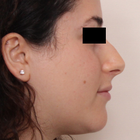
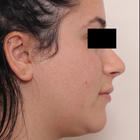
Full-side view
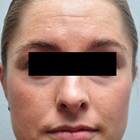
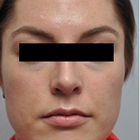
Front view
WHY US?
At Medijump, we're making medical easy. You can search, compare, discuss, and book your medical all in one place. We open the door to the best medical providers worldwide, saving you time and energy along the way, and it's all for FREE, no hidden fees, and no price markups guaranteed. So what are you waiting for?

Free

Best Price

Widest Selection

Risk-Free
What you need to know about Septoplasty in Tel Aviv
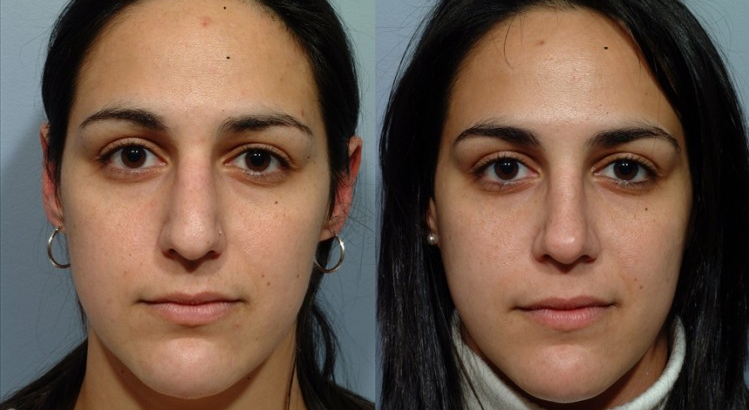
A septum is a bone and cartilage that separates the nasal cavity of the nose. When your nasal septum is off-center, crooked, or moved to one side of your nose, it is a condition known as a deviated septum and can make breathing difficult. To correct this condition, you may need to undergo Septoplasty, where your septum will be straightened to allow better airflow through your nose. This surgery is the only way to fix a deviated septum. However, septoplasty may also be performed to treat long-term sinusitis, remove nasal polyps, or treat other conditions that block the nasal airways. Sometimes, surgeons also recommend this surgery to stop recurrent nosebleeds and facial pains. For conditions other than deviated septum, surgeons often only recommend septoplasty after ruling out other treatments.
What does a Septoplasty Procedure Involve?
A deviated septum is common, but when the condition is severe, it can block one side of your nose and reduce airflow. It can also contribute to crusting or bleeding. If you experience difficulty breathing through your nose that significantly affects your life, you may want to consider septoplasty. Before the surgery, your doctor will review the details of the surgery and ask you to complete some routine tests, such as a blood test, electrical heart tracing, or X-ray. Be sure to tell your doctor if you have any possible allergies. To prepare for the procedure, you may need to stop taking certain medications at least two weeks before the surgery because they can increase your risk of excessive bleeding and the medications include aspirin, ibuprofen, and other blood-thinners.
Septoplasty can be carried out under local anesthesia or general anesthesia. If you have the surgery under local anesthesia, you should not eat or drink anything after midnight the night before the procedure. Not eating and drinking will prevent you from vomiting and choking if the anesthesia nauseates you during surgery. Your surgeon will start the surgery by making an incision on one side of your nose to access the septum. They will then lift the mucosa lining that covers the cartilage and bone. Next, they will reshape the cartilage and bone to move the deviated septum to the correct position. Extra pieces of bone or cartilage that make barriers will be removed. Then, they will reposition the mucous membrane. You may need stitches to hold the septum and membrane in place. Soft silicone splints are sometimes inserted inside the nostrils to support the septum. The whole procedure takes between 30 to 90 minutes to complete.
How Long Should I Stay in Tel Aviv for a Septoplasty Procedure?
Septoplasty is an outpatient procedure, which means you will likely go home on the same day of the surgery after the anesthesia has worn off unless major complications arise. However, you should stay in the Tel Aviv for 3-4 days for the initial recovery and follow-up checkups. If your surgeon places splints in the nose, they will be removed within seven days. You may return home when your surgeon allows you as long as there is no complication.
What's the Recovery Time for Septoplasty Procedures in Tel Aviv?
You may feel drowsy for a few hours following the surgery and you may also feel pain. However, your surgeon will prescribe medication to help with the pain. Some congestion and bleeding can occur after you are discharged from the hospital as your body recovers, but these symptoms should be gone in 2 weeks. The recovery period varies from one person to another. In general, you should be able to return to work within a few days, but you should allow at least three weeks before going back to your full normal routine. You should also limit your physical activities such as exercise for several weeks to minimize swelling and speed up healing because intense physical activities can increase your blood pressure and lead to bleeding.
What sort of Aftercare is Required for Septoplasty Procedures in Tel Aviv?
Your doctor will give you post-operative care instructions, which you will need to follow, The wound on your nose will heal fairly quickly, and your breathing will improve shortly after the procedure. For a quicker recovery, you may need to elevate your head at night to keep the swelling down, wear a button-up shirt so you do not need to pull clothing over your head, and do not blow your nose for at least two to three days after surgery. Avoid drinking alcohol, smoking tobacco, returning to work too soon, strenuous activities, and being in a crowd where people are smoking or coughing.
What's the Success Rate of Septoplasty Procedures in Tel Aviv?
The success rate for septoplasty is high, with up to 85% of people experiencing a significant improvement in their nasal blockage after surgery.
However, some people will require a second surgery if they are not satisfied with the results. Septoplasty is a very low-risk procedure, but you should be aware of the possible complications and side effects and these risks can include:
- Bleeding in small amounts is common, but in rare cases, excessive bleeding may occur.
- Infection can occur after septoplasty because the nose is not a sterile environment.
- Toxic shock syndrome is a very rare and life-threatening infection.
- Septal perforation is a small hole that can sometimes develop in the nasal septum during or after the surgery.
- Spinal fluid leak and it is extremely rare.
Other risks such as scarring, and altered nose shape, discoloration of the nose, a decreased sense of smell, tooth or nose numbness, and continuing symptoms are also possible. Other than following your surgeon’s aftercare instructions, keeping the nose clean and washing your hands often can reduce the risks.
Are there Alternatives to Septoplasty Procedures in Tel Aviv?
Although most conditions of a deviated septum can only be treated by septoplasty, there are nonsurgical treatments for other nasal blockages to help you breathe better. If your nasal blockage is caused by an allergy, you may take antihistamines from your doctor or over-the-counter. In cases of bacterial infection, your doctor can prescribe antibiotics to help clear the nasal airways.
Whilst the information presented here has been accurately sourced and verified by a medical professional for its accuracy, it is still advised to consult with your doctor before pursuing a medical treatment at one of the listed medical providers
No Time?
Tell us what you're looking for and we'll reachout to the top clinics all at once
Enquire Now

Popular Procedures in Tel Aviv
Prices Start From $1,945

Prices Start From $101

Prices Start From $192

Prices Start From $500

Recommended Medical Centers in Tel Aviv for Septoplasty

- Interpreter services
- Translation service
- Religious facilities
- Medical records transfer
- Medical travel insurance
- Health insurance coordination
- TV in the room
- Safe in the room
- Phone in the room
- Private rooms for patients available

- Interpreter services
- Translation service
- Religious facilities
- Medical records transfer
- Medical travel insurance
- Health insurance coordination
- TV in the room
- Safe in the room
- Phone in the room
- Private rooms for patients available

- Interpreter services
- Translation service
- Religious facilities
- Medical records transfer
- Medical travel insurance
- Health insurance coordination
- TV in the room
- Safe in the room
- Phone in the room
- Private rooms for patients available

- Interpreter services
- Translation service
- Religious facilities
- Medical records transfer
- Medical travel insurance
- Health insurance coordination
- TV in the room
- Safe in the room
- Phone in the room
- Private rooms for patients available
Septoplasty in and around Tel Aviv
About Tel Aviv
Tel Aviv-Yafo commonly referred to as just Tel Aviv, is the economic and technological center of Israel. Located on the Israeli Mediterranean coastline, the city is popular for its glimmering beaches, creative culture, non-stop nightlife, and architectural heritage. As Israel is becoming a popular medical tourism hub, thousands of medical tourists who seek medical treatments in this country choose Tel Aviv as their destination. The city’s medical system, as well as its doctors and medical professionals, are world-renowned. It boasts some of the finest medical centers, staffed with highly trained doctors and nurses. International tourists looking for world-class, innovative medical treatments can get any procedure they need for a fraction of the cost they would have to pay in their home countries.
Popular Parts of Tel Aviv
There’s no shortage of activities in Tel Aviv. With at least 300 days of sun per year, this hip and bustling city offer shimmering beaches for any sun-chaser. Gordon Beach is one of the most popular in the city. It boasts clear blue waters, volleyball courts, and a boardwalk full of restaurants serving fresh fish and Israeli cuisine. Besides the beaches, visitors usually go to the Tel Aviv Museum of Art. This impressive gallery is set inside the modern ‘envelope’ building by American architect Preston Scott Cohen. The museum provides a lot of activities and collections to see, but the highlight is the collection of Impressionist and post-Impressionist art, which features works by Pissarro, Renoir, Monet, Picasso, Van Gogh, and many more. Visitors who want to relax can visit Park HaYarkon, which is the city’s largest green space.
Transport in Tel Aviv
International tourists will arrive at Ben Gurion Airport, which is located 20 kilometers southeast of Tel Aviv. It serves flights to and from many cities around the world, including Seoul, Amsterdam, New York, and Beijing. The city’s relatively new overground railway system is the most affordable and easiest way to get around. Buses are available, but the routes can be a bit confusing. Taxis are widely available around the city and they are easy, albeit expensive, way to get around.
Visas in Tel Aviv
Holders of passports issued by 99 countries, including all EU countries, Canada, Russia, and the US can enter and stay in the country for up to 3 months without a visa. Most other nationals are required to obtain a visa prior to arrival and are recommended to contact their nearest embassy of Israel as some countries need a confirmation from the Israeli government before a tourist visa is issued.
Weather in Tel Aviv
Tel Aviv experience a typical Mediterranean climate. The winters are rainy and the summers are hot. The temperatures in the summer (June to August) can rise to 31°C - 34°C and the humidity can reach over 80%. Spring and fall have pleasant weather since the temperatures are not too high or low.
Additional Info
- Local Currency: New Israeli Shekel (ILS) is the official currency. 1 USD will get you approx. 3.5 ILS.
- Money & Payments: It’s easy to find ATMs around the city. Credit cards are widely accepted. Tipping is common, but typically not expected.
- Local Language: Hebrew is the official language, while Arabic has a special status as a semi-official language. Most people can speak English fairly well.
- Local Culture and Religion: Most of the population adheres to Judaism. Islam is the largest minority religion in the city, followed by Christianity.
- Public Holidays: The city celebrates several public holidays, such as Independence Day, Hanukkah, and Jerusalem Day.
Popular Searches
- Plastic Surgery in Thailand
- Dental Implants in Thailand
- Hair Transplant in Thailand
- Breast Augmentation Thailand
- Gastric Sleeve in Thailand
- Gender Reassignment Surgery in Thailand
- Laser Hair Removal in Bangkok
- Botox in Bangkok
- Dermatology in Bangkok
- Breast Augmentation in Bangkok
- Coolsculpting in Bangkok
- Veneers in Turkey
- Hair Transplant in Turkey
- Rhinoplasty in Turkey
- Stem Cell Therapy in Mexico
- Rhinoplasty in Mexico
- Liposuction in Mexico
- Coolsculpting in Tijuana
- Rhinoplasty in Korea
- Scar Removal in Korea
- Gastric Sleeve in Turkey
- Bone Marrow Transplant in India
- Invisalign in Malaysia
- Plastic Surgery in the Dominican Republic
- Tummy Tuck in the Dominican Republic
- Plastic and Cosmetic Surgery in Poland
- Rhinoplasty in Poland
- Hair Implant in Poland
- Dental Implants in Poland
- IVF in Turkey

